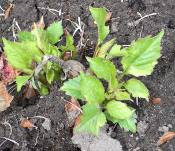 Several shoots are now visible on one of the dahlia tuber wheels planted in April (see 'Can A Dahlia Tuber Wheel Produce New Plant Vigour').
Several shoots are now visible on one of the dahlia tuber wheels planted in April (see 'Can A Dahlia Tuber Wheel Produce New Plant Vigour').Although we now know the technique works, there have been two problems:
- slugs
- poor nutrition in deeper holes
Wet warm weather is perfect for all kinds of slugs and snails. I had earlier treated the bed with organic slug pellets and therefore assumed it was clear of the pests. Unfortunatley not. Small garden slugs did great damage in the deeper holes, almost from the off. Had to revert to Metaldeyde pellets, which cured the problem (although, in fairness, I have to say that organic pellets seemed to work on the delphiniums earlier. a problem with organic pellets is that because the slugs go away to die, it's impossible to tell whether or not they have worked - until it's too late.)
POOR NUTRITION IN DEEPER HOLES
It's very easy to become too enthusiastic when trying out new concepts and ideas. This was such a case. As you can see, the leaves are rather pale, so this could indicate a lack of nutrients (it could also be other things, such as cold - or just because it's new growth).
I think this is because I got clever and failed to place the tubers on multi-purpose compost (I was short of it at the time), as recommended. This would have supplied all the nutrients necessary for healthy strong growth, as it did last year. Soil is most fertile in the upper 'A' horizon, usually within the first 15 to 20 centimetres (6 to 8 inches) where the micro-organisms are most active (due to adequate air).
THE GOOD NEWS SO FAR
Because several shoots are now growing up through this fertile 'A' horizon, the adventitious roots produced on the new stems will have easy access to soil nutrients in this area, something they otherwise would not have done. Thus, using this technique offers a kind of insurance policy against poor conditions.
2 comments:
Great post! It's like looking at a research experiment on dahlias. I'll just stick around for some added handy info and tips on growing dahlia tubers.
Thanks for the compliment. Glad you like it.
Post a Comment